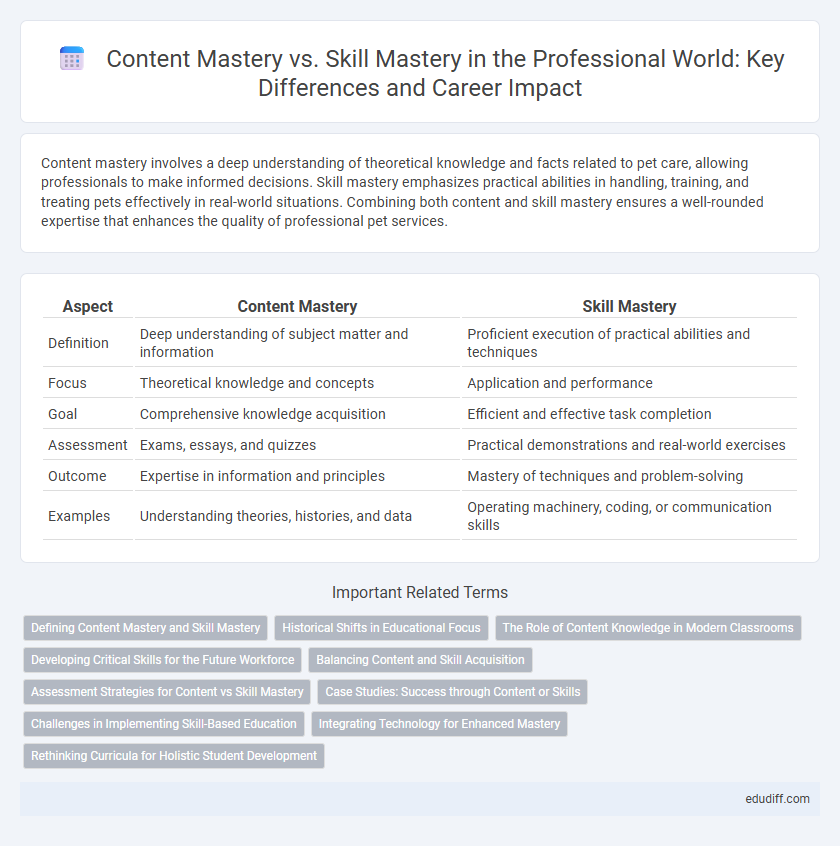Content mastery involves a deep understanding of theoretical knowledge and facts related to pet care, allowing professionals to make informed decisions. Skill mastery emphasizes practical abilities in handling, training, and treating pets effectively in real-world situations. Combining both content and skill mastery ensures a well-rounded expertise that enhances the quality of professional pet services.
Table of Comparison
| Aspect | Content Mastery | Skill Mastery |
|---|---|---|
| Definition | Deep understanding of subject matter and information | Proficient execution of practical abilities and techniques |
| Focus | Theoretical knowledge and concepts | Application and performance |
| Goal | Comprehensive knowledge acquisition | Efficient and effective task completion |
| Assessment | Exams, essays, and quizzes | Practical demonstrations and real-world exercises |
| Outcome | Expertise in information and principles | Mastery of techniques and problem-solving |
| Examples | Understanding theories, histories, and data | Operating machinery, coding, or communication skills |
Defining Content Mastery and Skill Mastery
Content Mastery involves deep understanding and retention of specific subject matter, enabling professionals to accurately recall and apply factual information. Skill Mastery refers to the proficient execution of tasks through practiced abilities, emphasizing hands-on competence and problem-solving techniques. Both are critical in professional development, but Content Mastery prioritizes knowledge acquisition while Skill Mastery focuses on practical application.
Historical Shifts in Educational Focus
Educational paradigms have shifted from content mastery, emphasizing memorization of facts, toward skill mastery that prioritizes critical thinking and problem-solving abilities. Historical reforms in curricula reflect the demand for adaptable competencies in dynamic workplaces rather than static knowledge retention. This evolution underscores the importance of developing transferable skills to meet contemporary professional challenges.
The Role of Content Knowledge in Modern Classrooms
Content knowledge forms the foundation of effective teaching, enabling educators to deliver accurate and comprehensive information. Mastery of subject matter supports the development of critical thinking and problem-solving skills essential for student success. Integrating content expertise with pedagogical strategies enhances the learning experience in modern classrooms.
Developing Critical Skills for the Future Workforce
Content mastery centers on acquiring domain-specific knowledge, while skill mastery emphasizes the development of critical thinking, problem-solving, and adaptability essential for the future workforce. Employers prioritize skill mastery as it enables employees to navigate complex, dynamic environments and drive innovation. Integrating skill-based training with content expertise ensures a versatile and resilient workforce prepared for evolving industry demands.
Balancing Content and Skill Acquisition
Balancing content mastery and skill mastery is essential for comprehensive professional development, ensuring both deep subject understanding and practical application. Prioritizing content acquisition provides foundational knowledge, while skill mastery enhances the ability to analyze, synthesize, and apply information effectively in real-world scenarios. Integrating these elements fosters adaptability and expertise, driving sustained career growth and performance excellence.
Assessment Strategies for Content vs Skill Mastery
Effective assessment strategies for content mastery emphasize evaluating knowledge retention and conceptual understanding through quizzes, tests, and written assignments. In contrast, skill mastery assessment prioritizes practical application and performance-based evaluations such as simulations, demonstrations, or real-world task completion. Aligning assessment methods with mastery type ensures accurate measurement of learner proficiency and supports targeted instructional improvements.
Case Studies: Success through Content or Skills
Case studies reveal that content mastery equips professionals with comprehensive knowledge essential for strategic decision-making, while skill mastery drives effective execution and adaptability in dynamic environments. Organizations leveraging content mastery gain deep domain insights, whereas those emphasizing skill mastery benefit from enhanced problem-solving and innovation capabilities. Balanced integration of both approaches leads to sustained success, demonstrated by superior project outcomes and accelerated career advancement.
Challenges in Implementing Skill-Based Education
Implementing skill-based education faces challenges such as aligning curriculum with real-world competencies, ensuring consistent assessment standards, and providing personalized learning pathways to address diverse student needs. Educators must balance theoretical content mastery with practical skill development, often requiring significant resource allocation and ongoing professional training. Resistance to change from traditional content-focused frameworks further complicates the integration of skill mastery in educational institutions.
Integrating Technology for Enhanced Mastery
Integrating technology in content mastery leverages digital tools to deepen understanding and retain complex concepts effectively. In skill mastery, interactive platforms and simulations provide hands-on practice, accelerating proficiency and real-world application. Blending these approaches through adaptive learning technologies fosters a comprehensive mastery environment that enhances both knowledge acquisition and skill development.
Rethinking Curricula for Holistic Student Development
Content mastery emphasizes comprehensive understanding of subject matter, while skill mastery focuses on applying knowledge through practical abilities. Rethinking curricula involves integrating both approaches to foster critical thinking, creativity, and problem-solving skills essential for holistic student development. Modern education frameworks prioritize adaptive learning experiences that align with real-world demands and lifelong learning competencies.
Content Mastery vs Skill Mastery Infographic

 edudiff.com
edudiff.com